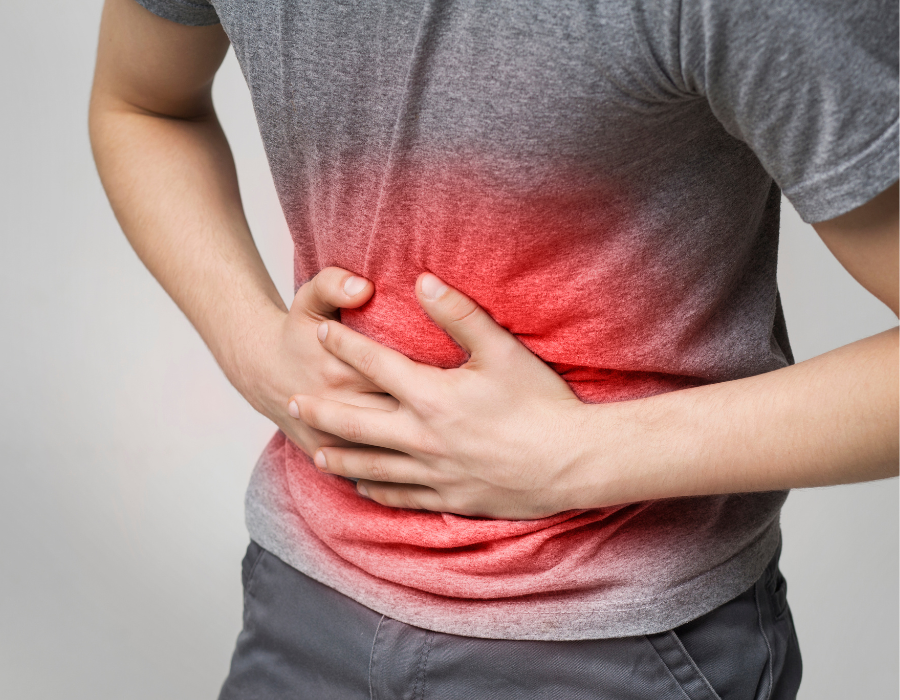A traumatic brain injury is a serious condition that can affect all aspects of someone’s life and is a major cause of death and disability around the world. While the impact to the brain and nervous system is often immediately recognizable, TBIs can leave lasting effects that extend beyond just the brain. A traumatic brain injury can have long-term effects on the gut microbiome leading to various gastrointestinal issues.
The reason for this is because the brain and the gut are connected and communicate with each other through constant dialogue. This communication system is called the gut-brain axis.
Communication of the brain and gut happens via pathways that include hormones, neural pathways and immune responses in the body.
Scientists refer to the little “brain in your gut” as the enteric nervous system (ENS). This brain is revolutionizing medicine’s understanding of the links between digestion, mood, health and even the way you think.
The ENS is two thin layers of more than 100 million nerve cells lining your gastrointestinal tract from esophagus to rectum. The ENS is a part of the autonomic nervous system, which also includes the sympathetic nervous system and the parasympathetic nervous system.
The autonomic nervous system is responsible for the involuntary processes in the body. The ENS is the part of the ANS that regulates the digestive functions of the gastrointestinal tract. It receives internal input from the gastrointestinal tract and external input from the brain and other parts of the autonomic nervous system to regulate digestion.
The ENS is responsible for various aspects of the digestive process in the esophagus and the intestines. It is sophisticated in its response to the changing needs of digestion, such as with diet alterations or if a virus or bacteria affects the gastrointestinal tract.
It connects the brain and the digestive system through its afferent and efferent nerves, which pass messages back and forth between the central nervous system and the enteric nervous system. The ENS controls secretions, blood flow, hormone release and the movement of food through the digestive tract, all of which are part of the digestive process.
The ENS also regulates the response to the food and drink that are taken in (vomiting and diarrhea if there’s food poisoning) and the central nervous system controls various parts of the digestive system and its functions, including stomach secretions and voluntary bowel movements.
An enormous number of neurons are specifically associated with the gastrointestinal tract to control its many functions. Neurons are cells found in your brain and central nervous system that tell your body how to behave. There are approximately 100 billion neurons in the human brain, and 500 million neurons in the gut, which are connected to your brain through nerves in your nervous system. The vagus nerve is one of the biggest nerves connecting your gut and brain. It sends signals in both directions.
The vagus nerve represents the main component of the parasympathetic nervous system, which oversees a vast array of crucial bodily functions, including control of mood, immune response, digestion, and heart rate. It establishes one of the connections between the brain and the gastrointestinal tract and sends information about the state of the inner organs to the brain via afferent fibers.
In all, the brain-gut axis is real. The brain-gut axis can link anxiety to stomach problems and so on, and, additionally, the very thought of eating could release juices in the stomach before the food even gets there.
The gastrointestinal tract is sensitive to emotion, and feelings of anger, sadness, anxiety and so on can trigger symptoms in the gut. Therefore, a person’s stomach or intestinal distress can be the cause or the product of anxiety, stress, or depression.
Often overlooked when looking at the gut-brain axis are brain injuries. A brain injury can affect the gut in a number of ways.
How Traumatic Brain Injuries Affect the Gut
When faced with something as devastating as a brain injury, many people are unaware just how much a brain injury can actually affect their gut health and indirectly cause digestive problems.
One issue they may face is increased intestinal permeability, or better known as leaky gut. After an injury to the brain, the connection become disrupted and the tight junctions that connect cells that line your gut become dysfunctional and loose, making it easier for larger substances such as bacteria, undigested food and toxins to pass through the walls of your intestine and enter your bloodstream. This can lead to high blood sugar, sepsis, organ failure, Celiac disease, diabetes, bacterial translocation and an inflammatory bowel disease such as Crohn’s disease. Symptoms may show up as early as six hours after the traumatic brain injury but can also show months or weeks later.
A traumatic brain injury can also affect your immune system. Your immune system monitors everything that passes through the gastrointestinal tract to the rest of your body and helps target any threats or harmful substances.
Additionally, the Central Nervous System controls much of the immune system and produces cytokines. Cytokines participate in many physiological processes including the regulation of immune and inflammatory responses. As a result, dysregulation of cytokine production or action is thought to have a central role in the development of autoimmunity and autoimmune disease.
Lastly, a traumatic brain injury can also cause severe psychological stress which can also inhibit the immune system.
Psychological stress can also lead to other issues with the gut and could potentially cause issues like irritable bowel syndrome, which can upset the gastrointestinal tract and produce symptom such as cramping, abdominal pain, bloating, gas, and diarrhea or constipation, or both.
A traumatic brain injury also affects the gut physiology and function. Roughly 50 percent of severe traumatic brain injury patients experience feeding intolerance, particularly in the first week after injury, which is correlated with injury severity. Other gastrointestinal related outcomes experienced by traumatic brain injured patients include gastroparesis and impaired lower esophageal function, which also contribute to food intolerance. Additionally, experimental models of traumatic brain injuries showed decreased intestinal smooth muscle contractility and delayed gastrointestinal transit between 1 and 7 days after injury. The hierarchical neural control of gastrointestinal motility, particularly of the upper gastrointestinal tract, involves modulation by the autonomic nervous system and enteric nervous system. Both systems are negatively impacted by a traumatic brain injury and likely contribute to the early gastrointestinal dysmotility in hospitalized traumatic brain injury patients.
The intestinal mucosa barrier is also affected by a traumatic brain injury and may contribute to long-term squelae.
According to the National Center for Biotechnology Information, “an effective barrier requires an intact epithelial cell layer connected by intercellular junctional protein complexes composed of tight junctions, adherens junctions, and desmosomes that allow selective passage of luminal contents. Regulation of barrier homeostasis entails a complex interaction among epithelial cells, immune cells, and enteric glial cells.
Mucus is also a component of the barrier, as its close association with gut epithelial cells provides a physical barrier to limit direct contact with pathogenic microbiota or other deleterious agents.
Clinical data on mucosal barrier function following a traumatic brain injury are sparse and limited to intensive care unit patients. Using lactulose/mannitol absorption ratios to assess gut permeability in traumatic brain injury patients, impaired barrier function was observed at 4 days after injury, but not earlier, and was correlated with severity of disease and long-term prognosis.
A traumatic brain injury had no effect on colonic mucosal injury or permeability at 6 hours after injury. In contrast, at 28 days after injury there were changes in morphology consistent with a colonic response to an inflammatory challenge.
Coincidently, at 28 days after a traumatic brain injury, paracellular permeability was enhanced in the colon, but not in the small intestine, supporting both temporal and regional differences in the gut response to a traumatic brain injury. The importance of these chronic effects, particularly in the colon with its concentration of microbiota, is underscored by the observation that traumatic brain injured patients who survived longer than a year after injury were 12 times more likely to die of complications of sepsis and 2.5 times more likely to die of digestive disease–related conditions compared with healthy, age-matched cohorts of the general population.
Thus, the gastrointestinal tract likely plays a key role in the long-lasting sequelae of traumatic brain injuries that impact patient health and quality of life.”
How to take care of your gut after a brain injury
It is imperative that you take care of your gut following a traumatic brain injury. It is important to eat foods rich in nutrition, exercise regularly and get plenty of sleep. Additionally, it is important to speak to your doctor about your gut’s health.
The vast majority of our microbiome is housed inside our digestive tract, and is responsible for our immune function, overall gut health, weight, brain health and so on. Additionally, probiotics can be valuable for maintaining gut health.
There are a few steps someone can take to nurture their gut and improve gut microbiome following a brain injury:
- Eat foods that are rich in prebiotics (apples, bananas, asparagus, garlic, onions, leeks, etc.)
- Eat foods rich in probiotics to help gut and brain health (yogurt, buttermilk, cottage cheese, sauerkraut, etc.)
- Eat foods high in fiber and whole grains
- Limit intake of artificial sweeteners as they could stimulate the growth of bad bacteria
- Get plenty of rest
- Take antibiotics only when necessary as they may kill both good and bad bacteria
- Avoid foods that can aggravate your digestive system (greasy or spicy foods)
- Stay hydrated by drinking plenty of water and eating fruits that contain water such as watermelon and strawberries
Even though the gut and the brain are so far apart, they are constantly striving for harmony through constant dialogue. Eating a healthy diet, exercising regularly, limiting stress, sleeping well and supplementing your diet can all help improve this connection.
For more information, visit www.neuropraxisrehab.com
Resources:
https://www.health.harvard.edu/diseases-and-conditions/the-gut-brain-connection
https://www.ncbi.nlm.nih.gov/books/NBK11097/
https://www.hopkinsmedicine.org/health/wellness-and-prevention/the-brain-gut-connection
https://pubmed.ncbi.nlm.nih.gov/29593576/
https://www.verywellhealth.com/enteric-nervous-system-5112820
https://www.healthline.com/nutrition/gut-microbiome-and-health#TOC_TITLE_HDR_6
https://www.webmd.com/digestive-disorders/foods-high-in-probiotics
https://www.healthline.com/nutrition/leaky-gut-diet



